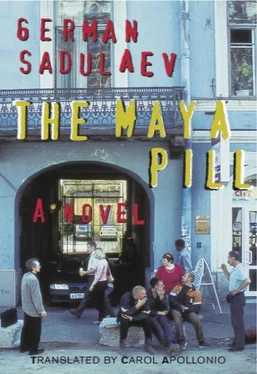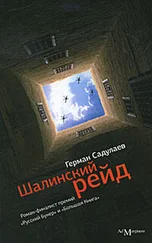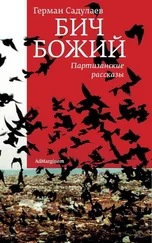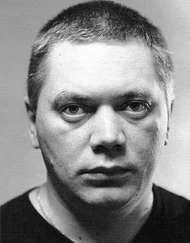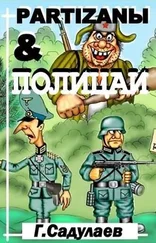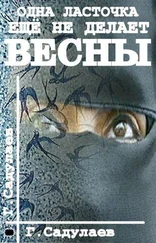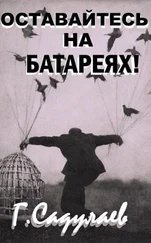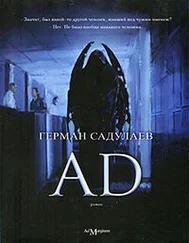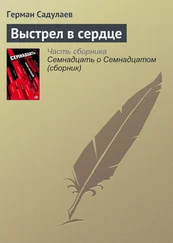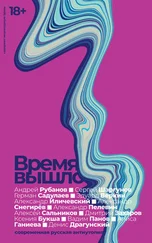What came now instead of dreams were thoughts. And memories. Sometimes from a very very long time ago.
I remember everything vividly to this day. We would take a trip. To the farm! To Zarechnoye! To Grandma’s! It was always special. The excitement would start the night before, when my dad would make an announcement: Tomorrow we’re going on a trip.
Hurray!
My sister would spend half the night packing all the things a girl needs: all eight dolls; a bag crammed full of paints and books; a separate bag with markers and colored pencils; three dresses, a bathing suit (she has only one, how annoying!), sandals, and belts; a makeup bag with a mirror; some little buckets and trowels, and a rubber duck. And in the morning my mom would get mad and make her leave most of it behind.
I would stand outside next to the car, aloof. Girls! Always dragging all kinds of useless stuff around wherever they go. You need to travel light. Like me: just the clothes I’m wearing and a slingshot in my back pocket.
And my favorite stuffed bear, a head taller than me.
My father called me to help, and—being men together—we loaded the usual gift for Grandma into the trunk: a bag of mixed fodder for her pigs.
Then we piled into the car—a red Moskvich 412—and headed out. My father was a cautious driver. He never even went out on the highway at night. Forty years of driving and not a single accident.
I used to get carsick. But I had to put up with it when we went to Zarechnoye. We drove all the way through Chechnya and Dagestan, to the Cossack settlements. Along the road we would see rows of gypsy encampments out on the steppe. We would drive down alleys full of ancient trees, lime trees, and every time he saw them my father would tell us that those lime trees had been planted during the reign of Catherine the Great.
For some reason he thought this was a big deal.
But then we would emerge from the dark forest, and a marvelous vision would open out before us: on both sides of the road the fields were covered with scarlet flowers in full bloom, opium poppies, mak , like my name; they were like a fire blazing, filling the whole steppe, flames as far as you could see!
And of course we would stop and gather big armfuls. And my mom wouldn’t scold us when we brought the poppies into the car and when they shed their petals, messing up the seats. She loved the flowers, and the color red.
Grandma always knew exactly when we would arrive. She would be outside standing at the gate, holding up her palm as a sunshade over her wrinkled forehead, looking into the distance. How did she know that our dusty, rattling old Moskvich had already reached Zarechnoye? Did the birds tell her?
She didn’t stand out there like that all day long, did she?
Inside the hut the air was hot and steamy from two days of baking: fish pies, potatoes and meat, salad, fruits. And a bottle of homemade red wine would stand on the table, waiting. Grandma had a vineyard—twenty sotki big! How did she manage it all?
Everything is so delicious! The grownups are lazy; they’ll just sit around gossiping, eating, and drinking the whole afternoon. But we have things to do. We grab some pie, drink a glass of wine each—like the grownups—and take off running.
To the Terek.
I could find the path with my eyes closed. Along Grandma’s fence to the end, then across a ditch and a field, and then a ravine and some woods, and finally there it was: the Terek! The river is big, smooth, deep. It wasn’t like the stream in our village, which only comes up to your waist, and only up to the grownups’ knees. No, the Terek has a strong current, and you shouldn’t swim out too far or you’ll be caught in a whirlpool and that’ll be the end of you. The vodyanoi demon will drag you all the way down to the bottom. My sister kept a close eye on me. If I tried anything, she yelled at me. She’s the older one. We’d splash around for a while, then make our way back to the hut.
It was dark at night on the farm. Keep your eyes peeled. Though why would you want to peel your eyes? I never got that.
Jackals howled on the other side of the garden, down by the Terek. If a traveler came across them at night, he was done for; they’d surround him and tickle him to death. And when they howled, it sounded like little kids crying, or else laughing really hard. Try and make sense of it. Maybe they had someone in their clutches out there.
I got to sleep in Grandma’s room, on a trunk. They’d already made my bed. I loved the trunk! Grandma told me that it was her hope chest; she brought her trousseau in it when she married Grandpa. Her family was rich—the trunk was huge! It used to belong to her mother, and before that, to her mother’s mother. Made of oak, with metal bands around it, and decorated with silver trim.
We went to bed. Grandma prayed to her icons first, and then got into her bed with its ornate cast-iron frame. I lay down on my trunk. But I didn’t want to go to sleep! I wanted Grandma to tell me stories.
“Tell me a story, Grandma!”
“What do you want to hear?”
“About the old days!”
“What is there to tell? I don’t remember anything!”
Grandma dissembled, delayed. That was part of the ritual; she did it every time. She would eventually tell a story, though, however much she protested, and when she did, she would talk and talk until after midnight.
First, for a warm-up, she’d tell about how the Reds came to the settlement. They stabbed Great-Grandpa to death with their sabers, right there in the bed where he lay wounded from battle. Before that, when Great-Grandpa was healthy and able to ride his horse, there was no way the Reds could have gotten into the settlement. Great-Grandpa was the ataman!
But then the Reds came, a shabby, rough sort of bunch—they said there’s no tsar anymore, and no God either!
They went around to all the huts and the church, gathered up the icons, and took them to the public square, where they piled them up and set fire to them. They put pots over the fires with the icons and tried to make watermelon honey. But the bottoms of the pots melted through and all the honey leaked out. They tried using different pots, but the same thing happened. And every time they tried a new pot, it would leak when they put it over the fire made of holy icons! So they couldn’t make their watermelon honey.
Because there is a God. The time will come when those godless men who sold Christ and their own eternal souls will weep bitter tears.
I’d heard the story countless times before, but I do not interrupt. It got more interesting from there.
“ Ba ! Tell about how it was after the war!”
“Oh, vnuchek ! It was a terrible time! So many soldiers lay dead on the fields— there was no one to give them a funeral and a proper burial. And the wolves came and multiplied! Fed on the carrion. Only there was something strange about those wolves. The people were strange, too. Everything went to support the war, and famine spread over the villages and cities—people ate one another to survive. It got so you couldn’t tell the difference between wolves and men.”
“Grandma, you’re scaring me! But those were just rumors, right?”
“What do you mean, rumors? I saw it myself.”
“Saw what, Grandma?”
“Well I’ll tell you. I was on a carriage going out of town. We used to work on the collective farm during the week, just to get our work credits. But to earn money to buy bread for the children, your mother and her sister, and their brother, I used to sell melons at the market. So I’m coming back from the market one night. And two Cossacks are walking along the road, strangers. They say, ‘Give us a lift, sister Cossack, take us to the station!’ but I really don’t like the look of them. They were dragging their feet, and their shoulders looked cramped, somehow, like they were wearing someone else’s shirt. Or like they were wearing someone else’s body. And their voices had a hollow sound to them. I didn’t say anything, just flicked the mare with the switch, giddyup, let’s get a move on. She was a good horse, and she took off at a gallop. But the devil made me turn and look back, and I saw two wolves skulking along behind the carriage, green eyes gleaming. No Cossacks in sight. I nearly died of fright. Barely survived. I kept praying and crossing myself the entire way home. That’s what saved me!”
Читать дальше
